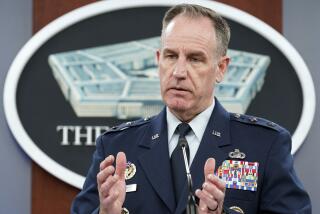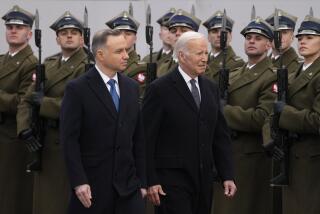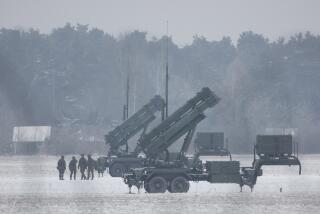U.S. audit finds $2 billion in questionable aid to Pakistan
WASHINGTON — The United States has paid more than $5 billion to reimburse Pakistan for counter-terrorism expenses that have often been exaggerated, if not fabricated, according to a government audit released Tuesday that blasts the Pentagon for poor management of the program.
The report concluded that the Pentagon could not properly account for as much as $2 billion in payments to Pakistan over a three-year period from 2004 to 2007.
Auditors uncovered an array of questionable costs, including $45 million for roads and bunkers that may never have been built; $200 million for the operation of air defense systems even though Al Qaeda has no known aircraft; and overcharges for meals and vehicles used by Pakistani troops.
Overall, the report by the Government Accountability Office concluded that the Defense Department had routinely covered costs without verifying that they “were valid, actually incurred, or correctly calculated.”
The Pentagon has paid about $5.6 billion to Pakistan in counter-terrorism reimbursement funds in the nearly seven years since the Sept. 11 terrorist attacks, by far the largest sum paid as part of the program to a counter-terrorism ally.
The audit acknowledges that the Pentagon has recently taken steps to improve its scrutiny of the expense reports submitted by Pakistan.
“Up until that point in time we would say that there was not sufficient oversight,” said Charles Michael Johnson Jr., director of counter-terrorism issues at the GAO and the principal author of the report. Even now, Johnson said, “we still point out concerns and areas where we think there should be further enhancements” of the Pentagon’s oversight of the program.
In particular, Johnson pointed to the Pentagon’s practice of reimbursing Pakistan without taking into account favorable fluctuations in the exchange rate. The document is the latest in a series of studies to criticize the Bush administration’s management of the Coalition Support Funds program, which was created in the aftermath of the Sept. 11 attacks and has doled out billions of dollars to 27 nations.
The report was greeted with outrage on Capitol Hill, where it was the focus of a hearing Tuesday by the House Subcommittee on National Security and Foreign Affairs.
“The more I learn about Coalition Support Funds to Pakistan, the more I am troubled,” said Rep. John F. Tierney (D-Mass.), chairman of the subcommittee. Tierney questioned whether the program should be discontinued or overhauled, saying it has “failed to beat back the Taliban threat to our troops in Afghanistan or the threat of Al Qaeda.”
The report provided the most detailed account to date of questionable reimbursements made to Pakistan.
The Defense Department paid Islamabad $200 million for radar expenses from January 2004 to February 2007, for example, even though U.S. military officials in Pakistan urged the Pentagon to reject the charges because “terrorists in the FATA did not have air attack capability.”
The FATA is the Federally Administered Tribal Areas along the border with Afghanistan, where Taliban and Al Qaeda leaders, including Osama bin Laden, are believed to be based.
The Pentagon also reimbursed Pakistan $45 million for road and bunker construction. But the accompanying documentation “did not provide sufficient support that all the claimed costs were based on actual activity or expenses,” the GAO report noted.
The Pentagon has subsequently declined to cover similar charges until Pakistan provides the coordinates of the roads and bunkers it claims to have built.
So far, “Pakistan has not provided this additional information,” the report said.
The GAO also documented apparent overcharges for meals and vehicle maintenance. During one period, the Defense Department was paying the Pakistani navy more than $3.7 million per year in repair and maintenance charges on “a fleet of fewer than 20 passenger vehicles” that was never used in combat. The charges amounted to more than $19,000 per month for each vehicle.
Pakistan sometimes seemed to be double-dipping, submitting separate charges for “vehicle damage” and “cost of vehicles repaired” without explaining the difference between the two categories.
In response to such criticism, the Pentagon has given U.S. military officials in Pakistan a larger role in scrutinizing that country’s counter- terrorism expenses, and has begun rejecting more requests.
Bobby Wilkes, deputy assistant secretary of Defense for Central Asia, acknowledged breakdowns in oversight but defended the program, saying that Pakistan could not afford to deploy and maintain 100,000 troops and paramilitary forces in the tribal areas without the reimbursements it receives from the United States.
The support funds are “critical to our eventual success in Afghanistan and the war on terror,” Wilkes said.
--
More to Read
Sign up for Essential California
The most important California stories and recommendations in your inbox every morning.
You may occasionally receive promotional content from the Los Angeles Times.










